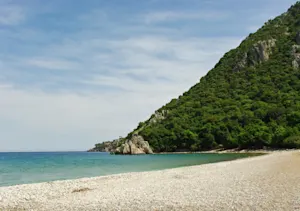What Makes This Word Tick
"Wanderjahr" is a delightful word borrowed from German that literally translates to "wandering year." It traditionally describes a year of travel spent gaining experience outside one's home environment. For older adults, the concept is particularly intriguing as it evokes a period of exploration and discovery—something that resonates with those reflective life's long journey.
If Wanderjahr Were a Person…
Imagine Wanderjahr as a worldly, adventurous grandparent who's collected stamps in their passport along with stories that rival those of Hemmingway. This lively spirit never turns down the chance for a new experience and believes that every road, no matter how winding, leads to another tale worth telling.
How This Word Has Changed Over Time
Originally, the term "Wanderjahr" was used for apprentices in Europe who traveled to different towns to practice their trade. This concept of a formative year of travel has since transformed into an appealing idea for anyone yearning for self-discovery, often prompting gap years and sabbaticals.
Old Sayings and Proverbs That Use Wanderjahr
While there aren't any English proverbs that use "Wanderjahr" directly, the sentiment resonates with sayings like "Travel broadens the mind" and "The world is a book, and those who do not travel read only a page." These reflect the enriching experiences associated with a wandering year.
Surprising Facts About Wanderjahr
Did you know some universities now encourage gap years, or modern-day Wanderjahrs, as part of their official programs? These institutions believe that students return more self-aware and better prepared to embrace their studies after a year of exploration and growth.
Out and About With This Word
You might encounter "Wanderjahr" in conversations about career breaks, spiritual quests, or cultural immersion trips. It's the perfect topic for a diverse group of retirees discussing their aspirations for new adventures over coffee or in travel documentaries.
Pop Culture Moments Where Wanderjahr Was Used
While not a household term in pop culture, the concept of a "Wanderjahr" has inspired many coming-of-age films and novels that highlight a personal journey or transformation through travel, such as the iconic 'Into the Wild' or 'The Motorcycle Diaries.'
The Word in Literature
Travel narratives and memoirs often embody the essence of a "Wanderjahr." Authors like Elizabeth Gilbert and Bill Bryson capture this spirit, showcasing the transformative power of stepping into the unknown and savoring the diverse tapestry of human experience.
Moments in History with Wanderjahr
In the Middle Ages, a "Wanderjahr" was an essential part of a craftsman's training, where journeymen honed their skills by working in various locations. This period emphasized learning and mastery, reflecting a historic value on gaining diverse experiences.
This Word Around the World
The term "gap year" is widely used in English-speaking countries today, with parallels found in many cultures that value taking time off to explore the world. In Japan, "Yutori kyoiku" refers to an education that prioritizes slow growth, indirectly supporting travel and life experiences.
Where Does It Come From?
"Wanderjahr" originates from the German traditions where young people, particularly journeymen, traveled to develop their craft. Etymologically, it combines "wandern," meaning "to wander," and "Jahr," meaning "year," perfectly capturing the concept of an exploratory delay.
How People Misuse This Word
Sometimes people use "Wanderjahr" errantly, thinking it merely means traveling or backpacking. However, the term implies a more structured journey with the intent of gaining personal and professional growth, not just leisure or sightseeing.
Words It’s Often Confused With
Gap Year: While similar, a gap year is typically associated with students taking time off between high school and college.
Sabbatical: This is more specific to professional breaks for rest, travel, or study.
Odyssey: While also a journey, it implies a more epic and lengthy adventure with challenges.
Additional Synonyms and Antonyms
Synonyms: Gap year, sabbatical, sojourn, journey.
Antonyms: Routine, stasis, confinement, monotony.
Want to Try It Out in a Sentence?
Many retirees plan a second "Wanderjahr" to explore new countries and cultures, often discovering fresh perspectives long after their first career winds down.
















